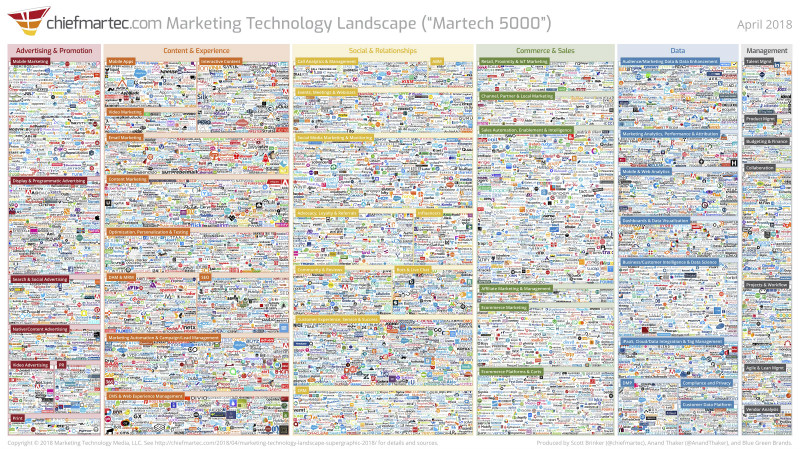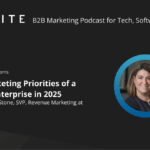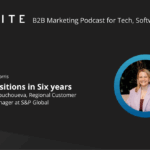Every month, we ask a Marketer in B2B Tech the questions you may have been asking yourself. We talk today, at Finite with Emma Westley, A Consulting CMO with senior marketer status at Symantec, Hewlett-Packard and Accenture, to name a few.
She makes an impassioned plea for more Test & Fail cultures in B2B, the unfair advantage of a diverse marketing team and the importance of curiosity over formal qualifications. This is a real humdinger of an interview, full of thought and passion, so put the kettle on and meet Emma…
Q. Do you think you need a formal marketing education to get into marketing?
Honestly, I don’t think you need a formal qualification or a formal education in marketing. A lot of the formal stuff that you’d get from the marketing bodies is theoretical and quite out of touch with how marketing actually works in 2019 and what skills you need to make it work, especially in big organisations. They’re still teaching the 4 P’s, for example!
I think you need something to show your commitment to the field and that you’ve got some sort of curiosity. I’ve come across people who are perfectly capable in the marketing field, but they haven’t got a certain diploma, so they’re never considered.
Q. The tools and technology in the marketing sector change quickly, how do you keep up?
Reading that monster graphic every year from Scott Brinker is always a good reminder of the challenges of staying up to date with the different sub-disciplines of digital.
My main research arena is social media, just actively checking what people are sharing, what new things are coming out, which I guess ties in with what we were talking about the interest and curiosity that is crucial to stay on top in marketing.
Also, don’t be afraid of trying some of the tools because there are two aspects about a lot of the tools that are out at the moment. First of all, the free versions – They all have one and the experience has to be phenomenal, and secondly, they’re unbreakable. A lot of them are drag and drop, and really user-friendly. Due to sheer competition, If they’re not, they won’t be around for long.
I keep a list of things that will keep my interest and then every week go look at my list and give it a try.

Warning; Opening this in full, may cause anxiety.
Q. You’ve been in a variety of different businesses and agencies of varying sizes and I assume varying structures. What’s been your experience of when a great B2B marketing team has come together?
It’s a very hot topic at the moment but I’d say diversity is important. By that, I don’t just mean in terms of you know, a good balance of male, female, lots of different cultures but also diversity of experience. I know you’re looking at maybe covering this in future events but I think having a B2C person in B2B marketing is actually really, really good.
You know everybody talks about ideas and where you’re getting your next ideas from, well the best place to get other ideas is if you go outside of your industry. You go outside of your comfort zone to improve. So if you’re in financial services for example, then you should get someone that’s worked in B2C retail. I truly believe that.
Q. How important is a culture of trying things and failing?
I’ve been in a mix of environments, where you’ve been allowed to try things and it’s been within the scope of your role to try things out and if it doesn’t work that’s fine. Some of the places I’ve been have not been like that.
A lot of the bigger, bigger companies will say they do it and then they don’t really so that you know, you’ll get the very, very top leadership saying we want to operate like a startup, you’ll get the top leadership saying that. Having experienced both sides of the coin, the best places (like HP) are the ones that allow you to test & possibly fail.
If you think about what your company is built on, it’s built on customers and employees. Marketing is not just marketing, It’s customer experience, It’s customer service. If you’ve not got someone on your board who represents your customers, and someone on your board who represents your employees, then that sounds to me a bit like a recipe for disaster.
Q. What’s your proudest marketing moment?
There are two to spring to mind. One was early in my career and I was doing packaging design for retail, working agency side, but for Hewlett Packard. The whole psychology of shelving and positioning in shops is fascinating. There was a big redesign going on, and It took months. Then it took months for it to go into production, then to actually get into shops. That moment when I went into a shop, I think it was a Ryman’s, and you see the box. If you’re with your family, for example, you go “I did that!”
The other one which is more recent, just shows how much your priorities change throughout your career, was when I was at MarketOne, who advise on what tech to use, and how to implement it. I was working with a client that worked in the semiconductor manufacturing space. Really niche tech. The internal marketing team were lovely. A lot of them had been in the company for a long time. They weren’t quite up to speed on things like automation, and even how to use their data, for example. What was interesting was that our business model was making the clients self-sufficient.
The amount of work this client was giving us was starting to go down a bit – which on the one hand was bad, but on the other, it was proof that we had done the job properly, because the client did say, “We know how to do this stuff now, you can stand down, because you taught us so well how to do it.” There is a certain sense of pride there too.
Q. What should an in house marketing team focus on, and what should they work with agencies on?
I wish it was different, but the reality is that, especially when you get to a certain size of company, in-house marketing becomes about processes and people. It becomes by making sure you’ve got your governance set up, or making sure all the right people are involved in different meetings, different stages of the project. You need to be certain that the processes are scalable, that the governance is in place around those processes. At that point, where the agencies come in is for ideas, and on occasion for cross-industry experience, or help with best practice techniques.
Q. I guess it very much depends on which role we’re talking about in terms of your career, but things like SEO, for example. If you went to an agency versus in house, was the business case, something like, “Here’s if we do it internally. Here’s an agency. This is the cost versus quality layout”?
It invariably does come back to a business case. Interestingly, one of the things I did when I was at HP was a business case going the other way, which was this department had been using an agency for years. I think they had gotten into a bit of a rut of farming all this stuff out to the agency, without really taking a step back and thinking if this was necessary.
When it originally started you could see the value that was being added by the agency, but over time we were frittering money away. It’s a case of not getting too complacent, as It did save the company quite a lot of money. I think it was a £500-750K saving in outsourcing costs.
Q. Are marketers now becoming technologists and is too much expected from the modern B2B marketer?
The first thing I’d say with this is it’s not just marketing. Sometimes I think we get a little bit in our mind and thinking we’re the only ones that are having technology come into everything. It’s the same for every department. HR is having the same thing happening.
They’re going down HR analytics, which is all very tech and data-driven. I’d also say as well if you look at the core of most companies now, nearly everything is tech to some degree. Everything that we do day today is tech-driven. It makes sense that marketing becomes a technology discipline. I don’t think that marketers are being asked to do too much, or there’s too much expected of them. I think I’d flip it and say it’s more of an opportunity for marketers to become more important within a business.
That said, I did see a ridiculous job description the other day.
Oh yes? Please share…
First of all, the role was called Audience Development and Marketing Ops. This is one role. Then it says, “You’ll need to love data, spot trends, dive deep into a spreadsheet, know your way around Marketo and other marketing tools, and also have experience in paid media and performance marketing with a test and learn approach.” I think actually what’s more important, which is the last thing on that, which should be at the top, is a test and learn approach. If you’ve got that ability, then surely that’s more important than what actual experience you had or what tools you’ve used.
Q. Should Senior Marketers have a seat in the boardroom? Why?
Unfortunately, there’s still a lot of companies that don’t have that kind of representation. I’d equate it to the HR function. These are two functions that still don’t have enough representation at board level. If you think about what your company is built on, it’s built on customers and employees. Marketing is not just marketing, It’s customer experience, It’s customer service. If you’ve not got someone on your board who represents your customers, and someone on your board who represents your employees, then that sounds to me a bit like a recipe for disaster.
I’ve seen a couple of cases recently where CMOs are now becoming CEOs. That needs to happen more because it’s traditionally your COO or your CFO or your CIO who becomes the chief exec. You think, what’s been holding the CMO from becoming CEO? Because that’s the voice of the customer. It should be. Yeah, absolutely, there should be.
Q. Lastly, you’ve spent some time agency side too – how has this changed perception? Can you do both?
When I first went agency to client one of the things that was quite interesting was when I was a client, I was able to enjoy working with agencies but I needed to know how to do a good brief. That was one of the biggest things, was actually putting proper briefs together for the agency, because I recognised the importance of that. The other thing that I could do as well, was I knew how the pricing had been put together. I was able to go back to agencies and say, “Look, I’m pretty sure we don’t need this and this. I know that you’ve marked that up.”
Going back to agency side I understood why things wouldn’t go as quickly as I’d wanted them to, or why I needed to involve 10 people on a presentation call because I’m thinking, “Why can’t they just present it to these two people?” But having done the client work I knew it’s because there’s this network of people. If given the opportunity, I would hire someone who has done both over one of the two.










